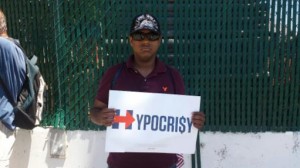
Months of strenuous campaigning, millions of dollars in political advertising, and countless days of retail politicking will culminate in just a few hours, when a select few will decide who will be awarded the first presidential delegates of the 2012 Republican race for President of the United States. Although not always an accurate gauge of who is ultimately nominated by the Republican Party-a fact pointed out rather inelegantly by Jon Huntsman-the Iowa caucuses do have a significant impact upon the results of future contests, particularly the New Hampshire primary.
That’s why it’s important that we scrutinize the words and deeds-and in some cases, rather extensive voting records-of those who seek the GOP nod to face President Obama this November. Specifically, from the perspective of the immigration enforcement and reform movement. There are a number of recent polls, from Insider Advantage to Rasmussen Reports, which all show more or less the same dynamics at play. Namely, a battle for the top spot between Mitt Romney and Ron Paul, a surging Rick Santorum, a rejuvenated Rick Perry campaign, and a large percentage of undecided voters who’ve yet to make up their minds. While Fox News has provided a helpful primer on the state of play in Iowa on the eve of the caucuses, it’s important that we take some time to ponder the implications of today’s vote, vis-a-vis sensible immigration policy.
We start with a candidate American Rattlesnake has neglected to cover this primary season, mostly because his support among Republican voters amounted to a rounding error, notwithstanding some noteworthy endorsements by conservative political organizations and evangelical Christian activists. However, times have changed for Rick Santorum, who now finds himself third among Republican presidential candidates in most Iowa polls. This rise allows us to examine Santorum’s record on immigration and border security issues, which is a mixed bag, at best. While his overall record is absolutely atrocious, if we’re going to judge him by his Numbers USA scorecard-which is as good a barometer of fitness as any in this regard-then the former senator from Pennsylvania is near the bottom of the pack in terms of potential GOP nominees. Roy Beck gives a harsh, but fair, analysis of Santorum in an overview for Numbers USA that I suggest you all read.
His record in the U.S. Senate and Congress was respectable, as Beck readily acknowledges, and got significantly better the longer he served-he was a strong “no” vote against the DREAM Act during the lame duck session of Congress convened by Senator Harry Reid. What’s more, he has tried to woo us during this primary-going so far as to condemn the sanctimonious scroungers at the United States Conference of Catholic Bishops who have turned societal pardon of illegal aliens into an official sacrament. That said, his record on E-Verify, probably the most effective immigration enforcement tool we currently have at our disposal-and a perfect wedge issue, as Mickey Kaus points out-has been positively abysmal, with his past votes and statements regarding legal immigration being a greater disappointment, although not an anomaly in this field, regretfully.
Santorum’s presidential candidacy reflects the essential dichotomy of the Republican field’s relationship to the subject of immigration. While almost every one of the candidates abjures the term “amnesty,” sometimes comically so, and is in a sense an improvement upon the the Republican Party’s previous presidential nominees, and certainly the previous occupant of the White House, almost all of them have serious limitations and flaws with respect to national identity, sovereignty, and the impediments to progress that our current policy of unfettered, mass immigration represents. The reflexive paeans both Newt Gingrich and Mitt Romney heap upon the disastrous H1-B visa program is but one example of the weakness of the top tier of Republican presidential candidates. Even Ron Paul, who has made admirable strides to highlight pivotal issues such as the insanity of extending birthright citizenship to the children of illegals and subsidizing those in this country who are trespassing, has regressed during this campaign.
Ironically, the wholly antagonistic nature of the Obama administration, which has effectively declared war on large swathes of the American population, presumably comprising a portion of the electorate he can safely discard, has actually served to enhance the profile of a crop of candidates that has a conspicuously dovish position on the subject of immigration. For even the disingenuousness of a Rick Perry or harebrained, semantic sophistry by a Newt Gingrich doesn’t approach the unremitting hostility this administration has displayed towards enforcing immigration law. From executive edicts that flagrantly defy the law, to implicit sanction given to localities that flout federal directives on immigration enforcement, to politically-driven witch hunts undertaken against those who have the temerity to enforce the law, President Obama has been an unmitigated disaster for American citizens who don’t profit personally from the illegal alien industry.
So in that sense, any Republican candidate-now that open borders libertarian Gary Johnson has officially abandoned the GOP-would be better than the current resident of the Oval Office. Unfortunately, that doesn’t mean that every Republican candidate would promote good immigration policy once elected to the presidency. Particularly disappointing has been the flagging campaign of Michele Bachmann, who at one point seemed poised not only to become a prime challenger to Mitt Romney, but also to put the issue of illegal immigration at the forefront of this presidential election. Unfortunately, like the presidential campaign of intrepid congressman Tom Tancredo, Bachmann’s candidacy does not look like it will garner much traction beyond the Iowa caucuses. The fact that Sarah Palin has consigned her to the realm of the Huntsmans of this race certainly does not bode well for her candidacy.
However, that doesn’t mean that the attention she -and even the abortive campaign launched by Herman Cain-gave to the subject of our misguided immigration policy-and the intentional recklessness of this administration in disregarding its duty to protect and defend our borders-did not have an impact on the dimensions of the Republican race. Nor does it mean that this issue will be forgotten any time soon, as the Supreme Court hearing regarding the appeal of an injunction against SB 1070 during the height of the 2012 presidential race ensures. Our porous borders and the devastating consequences of illegal immigration during a prolonged recession will be election issues, regardless of the attractiveness of the eventual GOP nominee. It is our job, as citizens and activists, to push whoever that candidate is in the right direction, and to demand that he make the contrast with President Obama on these issues explicitly clear. Our country can’t afford a return to the days of Obama v. McCain, or Bush v. Kerry…and neither can we.







Recent Comments